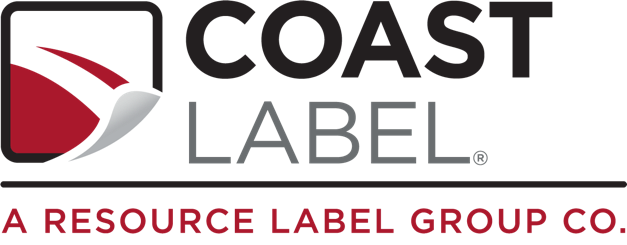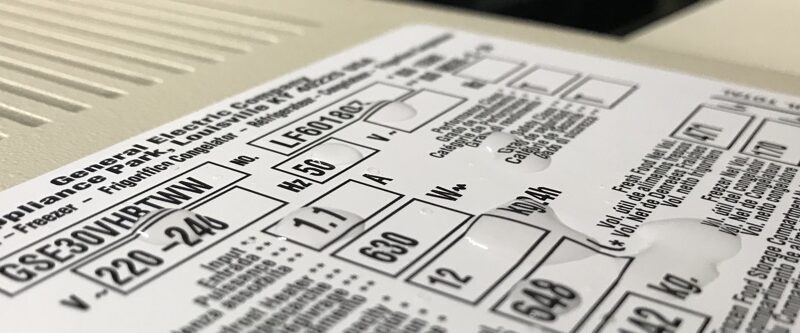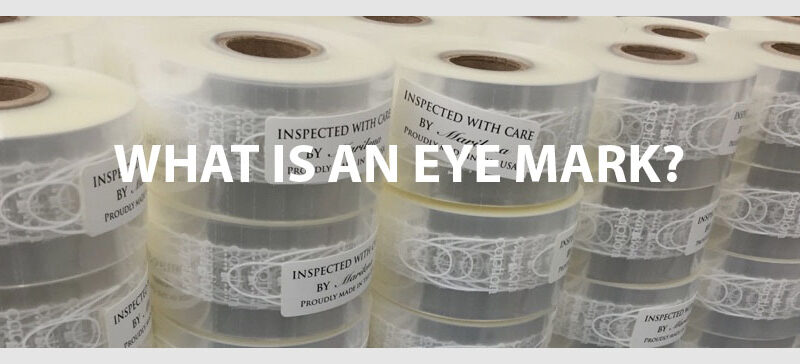If you sell products that come in contact with water, you might be wondering about the benefits of waterproof vs water-resistant labels. Both seem to do similar things, but there are some key differences between the two kinds of labels.
Water can damage the integrity of your labels, so you need to consider thoughtfully which kind of label to choose. Your labels are important. You need them to remain legible through all the processes of manufacturing, shipping, and consumption.
When it comes to waterproof vs water-resistant labels, which kind is best for you? That really depends on what your unique needs are. Read on to learn more about waterproof vs water resistance.
Waterproof Labels
Labels that are waterproof are designed to hold up against major exposure to water. They can be submerged in water, consistently rained or snowed on, and even go through the dishwasher without losing their integrity. In other words, they are tougher than water-resistant labels. Waterproof labels have a complete barrier to protect against water and other moisture concerns.
If your product will be consistently exposed to moisture, waterproof labels will be your biggest friend. Waterproof labels offer the following benefits:
- Durability through major moisture exposure. Labels won’t peel, curl, or tear.
- Legibility of label, even after submerged in water or rained on. Ink won’t smear or bleed.
- Compliance with industry standards. Depending on the industrial equipment you’re using, you may need waterproof labels so that important instructions and warnings remain legible and well fixed.
Water Resistant Labels
Water-resistant labels resist water. But how is that different from waterproof labels?
Essentially, water-resistant labels can withstand some exposure to water and oil-based liquids. Unlike waterproof labels, water-resistant labels don’t have a complete barrier to keep out water. They are typically printed on polypropylene or vinyl and then overlaminated. This makes it so the ink won’t bleed and the label won’t tear. However, water-resistant labels are not intended to be submerged in water or be exposed to moisture for long periods of time. Water-resistant labels will break down when subject to water for extended periods of time.
Consider water-resistant labels if your product will be splashed with liquid and wiped off or only briefly exposed to water. Water-resistant labels offer the following benefits:
- Ink won’t smear or bleed when coming in contact with water.
- Repels water and oil for short periods of time.
- Adhesive resists water and oil.
- Typically less expensive than waterproof labels.
Waterproof vs Weatherproof
Another decision you might need to make when designing your product labels is whether you need waterproof or weatherproof labels. Although the names sound similar, waterproof and weatherproof do have some differences.
Waterproof labels are designed to withstand exposure to water and moisture. They can handle the heat of the dishwasher or the cold of the fridge or freezer. But if your labels will be exposed to extreme conditions, you’re probably going to need to look at weatherproof labels.
Weatherproof labels are engineered to hold up against the most extreme conditions. They are more costly than waterproof labels because they use more durable materials and adhesives. You can expect them to last even longer than waterproof labels. Weatherproof labels can be used in the following circumstances:
- Extreme heat
- Extreme cold
- Extended exposure to the sun
- Contact with chemicals and oils
- Outdoor use
- Rough industrial conditions
- Medical equipment and pharmaceutical use
- Automotive use
- Chemical labeling
Waterproof vs Water Resistant: Which is Better?
So, you’ve seen the difference between waterproof vs water-resistant labels. Which one is better for you? Ultimately, that’s going to depend on your product or the intended application of the labels. Because waterproof labels use more durable materials, they are also more costly than water-resistant labels. But if you need them to withstand lots of moisture exposure, the cost is worth it.
Consider waterproof labels if your product or label will be submerged in water. For example, drinks stored in an ice-filled cooler or products that go through the dishwasher. Waterproof labels are also great for outdoor use and can handle a big downpour of rain or snow. If your product is wet, such as hot sauce or shampoo, you might also want to go for a waterproof label, just in case some of it spills on the label.
Water-resistant labels will resist water and oil exposure, as long as it’s not for very long. If your product will stay in a mostly dry environment, water-resistant labels should fit your needs. Customers commonly use water-resistant labels on food items or health and beauty products. Water-resistant labels cost less than waterproof labels but come with a little less durability than waterproof labels.
Conclusion on Waterproof vs Water-Resistant Labels
When looking at waterproof vs water-resistant labels, the best product will depend on your needs. Waterproof labels are more durable and will hold up better against long-term exposure to water. That does come with an added cost, however. Water-resistant labels are less expensive than waterproof labels. They do well with brief exposure to water and moisture but will not last when submerged or constantly wet.
If you need water-resistant or waterproof labels, contact Coast Label today. Click here for your free proposal. We’ll help you engineer a long-lasting label perfectly suited to your needs.


